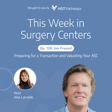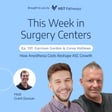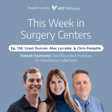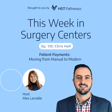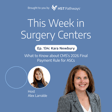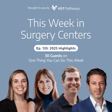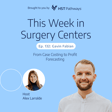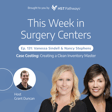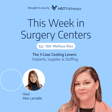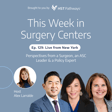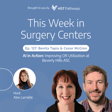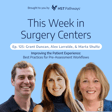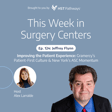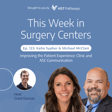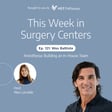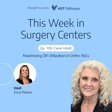Podcast Introduction
00:00:01
Speaker
Welcome to This Week in Surgery Centers. If you're in the ASC industry, then you're in the right place. Every week, we'll start the episode off by sharing an interesting conversation we had with our featured guests, and then we'll close the episode by recapping the latest news impacting surgery centers. We're excited to share with you what we have, so let's get started and see what the industry's been up to.
00:00:27
Speaker
Hi, everyone. Here's what you can expect on today's episode.
Guest Introduction: Elisa Alberto Widowsen
00:00:31
Speaker
This week, we're joined by Elisa Alberto Widowsen. Elisa is the Director of Nursing at Man Cataract Surgery Center, and she's here to talk to us about bridging the gap with nursing informatics. As technology's role in health care continues to expand, so too will the role of nursing informatics. So this is a really interesting and timely topic, and not one that a lot of people are talking about, but really should be.
Upcoming News Recap
00:00:57
Speaker
In our news recap, we'll cover what's going on with Kaiser and the California Nurses Association, the latest updates on the No Surprises Act, medical terms that are baffling patients, and of course, end the new segment with a positive story about a nurse who saved a man's life during a flight. Hope everyone enjoys the episode and hears what's going on this week in Surgery Centers.
00:01:25
Speaker
All right. How's it going, everyone? I'm your host, Rafaela Kinspe, here at This Week in Surgery Centers. We've got a fantastic episode this week that I have had on my calendar circled and just super pumped about. This week, I am joined by Elisa Alberto
Elisa's Background and Personal Life
00:01:41
Speaker
Widosin. She is the Director of Nursing at the Mann Cataract Surgery Center in Houston, Texas. And this week, we are going to be talking about
00:01:50
Speaker
bridging the gap with nursing informatics. So I think this is a really exciting topic, an area that I personally don't have a ton of knowledge on. So I think it'll be exciting to kind of learn here, talk about this topic. And I think all of our listeners are going to get a lot of value out of this one. So Elisa, thank you so much for joining us today. I appreciate you coming on the podcast. You're welcome. My pleasure.
00:02:13
Speaker
So for anyone who doesn't know a ton about you, can you just share with our guests just a little bit about yourself, your background, maybe what you guys are doing for the holidays? I think they'd all love to get to know you. Yeah. So my name is Elisa Alberto Widows. I am a registered nurse, currently serving as a director of nursing at Mann Cataract Surgery Center in Humboldt, Texas. I have two kids, one girl, one boy.
00:02:43
Speaker
I just got married actually three years ago, and he's from United Kingdom, and hence the last name Widowsen. There you go. My name, so I had to keep it. I am currently in graduate school to obtain my nursing administration degree. I love everything about patient care and promoting patient safety. As far as the holidays, we are planning to go to Universal Studios. Awesome. That's super exciting.
00:03:14
Speaker
Congrats on being in grad school and all your professional success there as well, and also on your family. That's fantastic. Universal Studios is a good time, so I think y'all have a lot of fun there.
00:03:26
Speaker
Absolutely. Yes. Yeah. And I appreciate, you know, I'm actually, I'm from Houston and I love that you clarified there on the Houston versus, versus on bull piece. Cause I do think that happens a lot where everyone kind of categorizes all of the cities and kind of areas that are kind of tangential to Houston. So kind of pulls them all together, but I think it's good. That's, that's how I know you're, you're truly, truly from, from Texas when you, you're able to kind of give everyone the clarification there. So love it.
Mann Cataract Surgery Center Overview
00:03:55
Speaker
All right. Well, jumping in, you know, we've got an exciting topic today and I want to dive in there, but you know, when it comes to the surgery center that you're with, you're with the Man Cataract Surgery Center, would it be correct to assume you guys are an ophthalmology center? Yes, we are. Awesome. Awesome. And for anyone who's not familiar with the Man Cataract Surgery Center, anything you want to share about the surgery center before we get started?
00:04:22
Speaker
Um, just free marketing. So, uh, when I, for those who do not know, we, it was founded in 1977. Um, Dr. Mike man, who was the founder of our healthcare organization, um, always had a vision for innovation and advancements in technology. Um, obviously to promote optimal care for our patients. I mean, that's always been his niche. Okay. Um, our specialty is ophthalmology and we have several board certified surgeons.
00:04:52
Speaker
who perform different ophthalmology cases from cataract, glaucoma, and oculoplastic surgeries. And on average, we average about 660 cases between our two ASE locations monthly.
00:05:06
Speaker
Awesome. Awesome. That's fantastic. So now that we have a sense of your background a little bit on the surgery center that you're with, jumping into the topic today on just that nursing informatics, I feel like that's an area that the name makes sense.
What is Nursing Informatics?
00:05:25
Speaker
But in terms of if someone asked me to describe it, I probably wouldn't be able to give an accurate description there. So I imagine some of our listeners might have a similar gap on their knowledge of it.
00:05:36
Speaker
If you were given a quick overview on just what nursing informatics is, how would you describe that in kind of a brief sense? Yeah, it's funny you said that. I asked my sister who's also a nurse. She's a travel nurse and I asked her, how would you define nursing informatics? She's like, what the heck is that? She's been a nurse for 14 years.
00:06:03
Speaker
Nursing informatics is basically it's integrating the use of data and healthcare technology to help with enhancing patient outcomes, reduce medical errors, and also it also provides efficient results in clinical procedures for patients and the nursing staff. Basically it's like with EMR systems, even just blood pressure machines, EKG machines,
00:06:33
Speaker
Those have made, those are some examples that made the biggest impact in our surgery center, to be honest. And to me, nursing informatics is improving the patient care and safety overall.
00:06:52
Speaker
That makes sense. The elements you mentioned there in terms of that clinical data and how that is leverage to inform that makes a lot of sense around improving the patient care. When I think about that, there's a lot of industries and in many senses in particular with healthcare that are becoming more informed with data and
Nursing Informatics in Education
00:07:12
Speaker
leveraging that information to improve their processes, their systems, the way that they drive value for their customers. And in the case of healthcare or patients, do you feel like this is a concept that's kind of relatively new in terms of the nursing side of it? As far as nursing informatics, I would actually say yes and no, only because the advancement in technology and healthcare
00:07:39
Speaker
Has taken a leap I would say since the 1980s, right? Slowly like the advancements just slowly has progressed However nursing and the field of nursing informatics itself. I would say yes, it's a fairly new concept. Yeah But it's definitely gaining a lot more attention now Yeah, I think it's important that this should be part of the nursing education
00:08:07
Speaker
whether you're an associate degree of nursing or bachelor's or master's, I think from the get-go, I think that's something that needs to be taught because of the advancement of technology in healthcare. That makes sense. To answer your question, it is a fairly new concept.
00:08:28
Speaker
No, that makes sense. I feel like I could probably have an entire podcast episode on that kind of education side of it in terms of things like that that should be included at every level of education across nursing. So that's a great call out there and it makes a ton of sense to me.
00:08:45
Speaker
as I think about what that means and how that translates for our listeners, you know, we have lots of listeners that are at surgery centers across the country. And I'm hopeful we're getting, you know, I've seen some more international stats, we got a couple listeners from outside the country. So, you know, a lot of people working at surgery centers in different places. And if you know, they were kind of taking an approach to this, it seems like something where if you're using
00:09:08
Speaker
any technology in your surgery center, whether that's an EMR, an EKG, or even a blood pressure machine. There's probably lots of data and information that would impact how you are treating your patients. And if I'm one of our listeners right now who's kind of hearing this and thinking, okay, this is probably important for me, what's my starting point on this? How do I start taking an approach on nursing informatics in my surgery center?
Staff Involvement in Tech Decisions
00:09:35
Speaker
Right to me, I would say when you're selecting any type of equipment, whether it's a new EMR system, a new EKG machine or blood pressure machine, it is vital that you involve the staff members who's going to be using the equipment or the system, the decision making, because
00:10:01
Speaker
After all is said and done, they will be the ones who's going to be using this on a daily basis with the patient. Another thing is making sure that the interface is user friendly. That's very crucial in my opinion. It's also to ensure the safety of the patients. Training is also vital, making sure that once you get a new system in place in your surgery center, make sure that your
00:10:31
Speaker
your staff members are properly trained. And if they're not, then spend the time training your staff members, especially not to call anybody out, to be honest, but the baby boomers, the different generation, you got them, those are so good and computers, and you got the baby boomers, who's been a nurse for, God knows, 20, 30 years, and they get an EMR system, and they're going, what the heck? I want to go back to paper.
00:10:58
Speaker
especially within a surgery center, efficiency is such a big thing. So having said that, we always want to put the safety of the patients and efficiency is second. So that's that.
00:11:15
Speaker
That makes sense and I want to dive in a little bit on some of the things you mentioned there between two key things I think you called out there. One, you mentioned that kind of difference between paper versus an EMR there and this is still a factor in both scenarios. Do you feel like the approach when it comes to kind of having that data and the information on this, do you feel like there's a gap between centers that might be on paper versus centers that are on EMRs and kind of their approach to nursing informatics?
Balancing EMR and Patient Care
00:11:45
Speaker
I believe so. And I noticed it every day. I think nursing is both an art, right? And it's an art and science. One cannot exist with the other. Having said that, with the advancement of technology and healthcare, which recently we just had a new EMR system, and I see my nurses just focusing on the computer.
00:12:14
Speaker
that eye contact with the patients is losing that caring, so to speak. Yeah. So I think nurses get they get lost in transition in a way. Because they've been so used to with with the paper, you know, paper charts. And then now you implement this new system now they're
00:12:42
Speaker
They just don't know what to do. And they just want to make sure they're documenting properly. They're getting the patients ready for surgery and for getting that care aspect of the patient. So I think that's something that I would like to reiterate that make sure that you're looking at your patient when you're, when you're assessing the patient, stop looking at your computer, you know, even intermittent. Just, just have that eye contact with that patient. Um, even the sense of touch, if it's, if it's all right with that patient, you know, make sure that you're showing them,
00:13:12
Speaker
that you do care and they're just not a number.
00:13:15
Speaker
Yeah, that makes sense. That makes a ton of sense. And it kind of feeds into what you mentioned before around the training aspect as well. I feel like that balance there of one, obviously leveraging the technology, but to that, you know, kind of that bedside manner and engagement with the patient. Do you feel like the kind of what you were mentioning before around training, do you feel like that's a factor in the way that kind of nurses approach not only the data that they're going to leverage from the technology, but also how they interact with patients?
00:13:45
Speaker
I believe so. I think it's also important that they do not lose their core values with taking care of patients, with integrating all this advancement in technology. And again, it's that caring aspect of nursing. I agree. I agree. I mean, I feel like there's so much of it that's based on the nurses obviously having a
00:14:11
Speaker
a deep concern care for their patients. So that makes a ton of sense to me. As I kind of think about that, and also just thinking about how technology's role in healthcare kind of continues to expand and evolve. And I feel like on a similar parallel to that, the role of nurses and kind of the nursing informatics piece of it evolves in a very similar way. For our listeners, can you kind of share an example of how
00:14:39
Speaker
You've used your knowledge to kind of bridge some of the gap there between the new technology that's coming in and kind of the science and approach of nursing.
Emotional Intelligence in Nursing
00:14:50
Speaker
Just like what I've mentioned, nursing is both art and science, and that's something I have learned all throughout my nursing career. It is important for a nurse to have a sense of emotional intelligence, treating a patient.
00:15:08
Speaker
Um, and that's something that they did not teach in nursing school. Unfortunately, even growing up, it's something that my parents bestowed upon me growing up, you know, from the Philippines were born and raised. That's something that my parents instilled in me, you know, respect, caring. And even if I didn't become a nurse, that's something that was in me. And, and that's something that I incorporate when I'm treating
00:15:38
Speaker
and taking care of my patients. And as far as a nursing leader, I try to bridge the gap by training those staff members that are needing the training or someone that needs education on emotional intelligence. And that's something that's very, very difficult to fix because that's like someone's personality.
00:16:09
Speaker
No, that makes sense though. But you learn in time and experience. That makes sense. I think both to that point around the emotional intelligence and that just kind of overtime with the experience, it's ways that you kind of will get there. And I agree with you, emotional intelligence is such a huge factor and not only kind of nursing, but really in any professional environment. I think the way that we handle our engagement with other people and kind of
00:16:38
Speaker
the impact that it has on our business, but also on obviously the lives that we're engaging with and especially in healthcare, it's super critical. So that makes sense to me. Awesome. So I feel like we've hit a number of really good topics and I'm excited for some of the different kind of nuggets and clips that we're going to take from this because with all of our episodes, we always kind of take these clips and there's the whole episode, but there's some of these really exciting parts. I feel like we've got some really good stuff here that people will be playing back over and over.
00:17:08
Speaker
with all of our episodes, you know, there's something that we do every week with our guests and we ask our guests, what is one thing our listeners can do this week that they can do to improve their surgery center? So I'd love to get your thoughts there. I would say in any surgery center, a great surgery team is what makes an ASC successful. My advice is leaders
00:17:36
Speaker
you must show your appreciation to your staff because happy staff means happy patients and it all translates to increased patient satisfaction and better outcomes. Awesome. I love that. I love that. Being kind of focused on treating your staff the right way and that impact on the patients makes a ton of sense there. You can have all the tools in the world, but at the end of the day, it's the staff members.
00:18:06
Speaker
the team itself is what makes it, what makes it work. Awesome. Love it. Well, Lisa, this has been a fantastic episode. We've got some great nuggets here for our listeners, some gems that they'll be able to take back to their surgery center this week. Um, you know, for anyone who wants to reach out and get ahold of you or contact you, is there any, um, any way that people can get in contact with you if they have more questions about nursing informatics or, um, any other things like that that they want to learn from you?
Contact Information for Elisa
00:18:33
Speaker
Absolutely. They could email me. It's ealberto at mani.com. M-A-N-N-E-Y-E.com. Awesome. We'll have to have our producers put those links in the podcast description so that people can quickly email you. That's great. I appreciate this so much. Thank you for coming on the pod. And we look forward to hopefully having you back on. All right. Thank you, Ralph. All right. Thanks. Bye.
00:19:06
Speaker
As always, it has been a busy week in healthcare, so let's jump right in.
Kaiser and California Nurses Association Contract
00:19:11
Speaker
First and foremost, we have to talk about what's going on with Kaiser Permanente nurses in the state of California. So to set the scene, the California Nurses Association is a union that represents about 22,000 nurses across 22 different Kaiser facilities. In June, negotiations began between the California Nurses Association and Kaiser
00:19:34
Speaker
in an effort to avoid what would have been the biggest private sector nurses strike in American history. Thankfully, on Monday, December 5th, after months of negotiations, the union announced that its nurses voted to ratify a new four-year contract and the strike would officially be called off. So what is in this new four-year contract? This article from Med City News sums it up nicely.
00:20:02
Speaker
2000 new positions in Northern California, a 22.5% wage increase over the next four years, increased tuition reimbursement for nurses continuing education, a guaranteed three-month stockpile of personal protective equipment,
00:20:23
Speaker
scaled workplace violence prevention plans. And lastly, a promise to eliminate racial and ethnic disparities in patient outcomes, promote culturally competent care delivery, and expand the diversity of its workforce. So there's a ton of stuff in there that is groundbreaking, but obviously this is a huge win for the nurses union, but also for patients in California.
00:20:49
Speaker
and the quality of care that they're receiving, these ratifications will allow nurses to work more safely and under better conditions, which will ultimately improve their experience and outcomes.
No Surprises Act Update
00:21:00
Speaker
In our second story, CMS delayed the enforcement of good faith estimates stemming from the No Surprises Act. So just a quick reminder as to where we are today. Per the No Surprises Act, as of January 1st, 2022, providers, which includes ASCs, are required to notify uninsured and self-pay patients
00:21:24
Speaker
of their ability to request a good faith estimate of expected charges and deliver it to the patient upon their request. So, and even though the good faith estimates will ultimately be expected to include charges from ancillary providers involved in the procedure, CMS delayed enforcement of those charges from co-providers and co-facilities for 2022, and the enforcement was expected to begin on January 1st, 2023, just a couple weeks away.
00:21:54
Speaker
But CMS has actually now extended that date in the enforcement of that indefinitely. So even though the enforcement is not happening just yet, it absolutely will come eventually. This is one of those things where waiting for the federal requirement is not the recommended approach. I know there's been a lot of questions, concerns,
00:22:17
Speaker
even lawsuits around the No Surprises Act, but patients are becoming more familiar with it and they are becoming more vocal when it comes to their rights and what they consider fair and wanting to know exactly what they owe.
00:22:31
Speaker
best they can prior to having their procedure done. So you will still absolutely want to get ahead of what's coming down the pike, especially if it's something that's in your patient's best interest and if done correctly will help surgery centers get paid faster as well. So just know that right now it's suspended indefinitely and we will be providing updates as soon as there is something to share.
Confusing Medical Terms
00:22:55
Speaker
In our third story from NBC News, Dr. Michael Pitt is a program director and professor at the University of Minnesota, and he recently polled 215 non-medical folks on common words and phrases that mean something different in the medical world
00:23:12
Speaker
than they do in day to day conversation. I thought his findings were really eye opening and just wanted to share what he had found. To start, he found that patients were getting confused by with the terminology of negative and positive. So, for example, the fact that a negative cancer test is actually a good thing and a positive cancer test is actually a bad thing
00:23:37
Speaker
can be confusing for patients. Using those simple terms can trip people up. Another example he shared is when you have a chest x-ray done and the doctor tells you that it was very impressive, 79 percent of those polled said that they would assume that an impressive chest x-ray is a good thing, but in fact, it means the doctor has something that he or she is worried about.
00:24:05
Speaker
Other examples were describing a tumor as progressive or telling a patient that we're going to put you to sleep which is a saying most have.
00:24:15
Speaker
only come across at the end of their pets lives, unfortunately. So simple terms like that can be misconstrued by patients. And lastly, he said the term most surveys were confused about was a cult. Those surveys thought it was related to witchcraft or meant something demonic when it actually does not in the medical world.
00:24:37
Speaker
First, I thought these data points were interesting in general, but also just a reminder to remember that speaking clearly with patients is so important and even simple words like the one shared and not even the complicated medical terms can still leave patients feeling confused and maybe more stressed than they have to be.
Heroic In-flight Rescue
00:24:56
Speaker
And to end our new segment on a positive note in a story shared by the Daily Nurse, Cassandra Josie and an unnamed doctor
00:25:05
Speaker
helped save a passenger's life in the middle of a flight.
00:25:08
Speaker
The flight attendants asked if there were any medical personnel on board. So a doctor jumped up and accepted Cassandra's offer for help after she shared that she was a nurse. The passenger was unresponsive and despite a tight aisle, no tourniquet and turbulence, she was able to start an IV and provide much needed fluids. So thanks to Cassandra and the doctor, the man is now awake and stable.
00:25:36
Speaker
And that news story officially wraps up this week's podcast. Thank you, as always, for spending a few minutes of your week with us. Make sure to subscribe or leave a review on whichever platform you're listening from. I hope you have a great day and we'll see you again next week.

